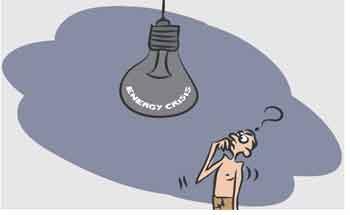Reply To:
Name - Reply Comment
 Following a long spell of about five months of rainfall in most parts of the country, especially in the wet zone which devastated the agriculture in those areas, the country has begun to experience seemingly a similar long spell of drought which seems to be carrying devastating effects on the same farming community.
Following a long spell of about five months of rainfall in most parts of the country, especially in the wet zone which devastated the agriculture in those areas, the country has begun to experience seemingly a similar long spell of drought which seems to be carrying devastating effects on the same farming community.
It might have a huge effect on hydro power generation as well, making in turn a negative bearing on the electricity consumers who have already been hit hard by two consecutive tariff hikes within a short period with relatively massive margins such as 70 percent. Interestingly, the authorities responsible for supplying electricity to the country (who refused to reduce the electricity tariff during the recent rainy period despite repeated requests by various groups in the country) are going to reduce the tariffs by 18 percent now, according to media reports.
The proposed tariff reduction does not showcase the magnanimity of the politicians or the officialdom in the power sector since they were first prepared to reduce the tariff only by 3 percent despite their admission that the Ceylon Electricity Board (CEB) has earned a considerable profit through hydro power generation due to the long spell of rainfall in late last year.
The attitude of the higher ups of the power sector towards the ordinary electricity consumer was well manifested by the insensitive statement of the former Spokesman of the CEB, Noel Priyantha who asked the consumers to light oil lamps, if it is not affordable to use electricity. Still the trade unions in the power sector argue that the tariff reduction should be 33 percent based on the favourable situation created by the recent rainfall.
Even an 18 percent reduction of tariff would not alleviate the sufferings endured by the people and the harm already done to the individual families and the Small and Medium Enterprises (SMEs) in the country. Media reports said that an average family that uses around 90 to 100 units of electricity a month and pays around Rs. 5,000 a month would get a tariff reduction of about Rs. 1,000. It must be recalled that the same family paid only around Rs. 1,500 before the two recent tariff increases.
That shows an average family has to pay threefold of what they paid before the crisis, without any increase in their revenues in most cases, even if an 18 percent tariff reduction is offered. A survey conducted by the Department of Census and Statistics found that 263,000 Micro, Small and Medium scale enterprises have been closed due to the effects of the COVID-19 pandemic and the economic downturn that ensued. Power and Energy Minister, Kanchana Wijesekara told Parliament recently that the power supply for more than one million families has been disconnected due to default of payment.
Only a section of the society – those who have the leverage on the prices of their own production of goods and services – has coping strategies in the face of price hikes in particular and the economic crisis in general. Salary earners, daily wage earners and the farmers (the prices of whose products are determined by the middlemen) have no coping strategies but to succumb to the market pressures even by reducing their meals or the quality of them. It is against this backdrop that one has to look at the pressure exerted by the power sector on the general public.
The response of the IMF which was instrumental to the recent huge electricity tariff hikes through its cost-reflective pricing formula for the government’s proposal for the 18 percent reduction of power tariff is not yet clear.
Successive governments’ failure to construct new power plants is blamed for the current energy crisis. However, the anathema on the part of the officialdom towards the low-cost solar and wind power generation and their love for fossil fuels fired thermal power plants was also unofficially blamed for the problem. Those governments had over the years planned coal, thermal, Liquefied Natural Gas (LNG), wind, and solar power plants to face the impending crisis. But except for the Chinese-built Norachchoali coal-fired power plant, nothing has materialized. However, penalizing consumers for the mismanagement of the sector by the authorities is unacceptable.